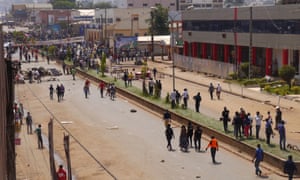Fears for jailed activists as Cameroon cracks down on anglophone minority
Agbor Balla and Fontem Neba could face death penalty over protests to promote rights of nation's English-speaking minority
949
Ruth Maclean in Dakar
Two activists jailed for trying to promote anglophone rights in Cameroon will remain in prison after their trial for terrorism was delayed without an official explanation.
Human rights lawyer Felix Agbor Balla and university lecturer Fontem Neba, who were arrested last month, could face the death penalty for organising peaceful protests to promote the rights of the English-speaking minority in the central African country.
What is today known as the Republic of Cameroon was, from 1922 to 1961, split into a French territory and a British mandate territory. Since independence, many anglophone Cameroonians have felt marginalised in a country where the majority speaks French.
Protests erupted late last year against the use of French in courts, and quickly spread to schools and universities after teachers agreed to strike over the dominance of the French language.
In Bamenda, the country's largest anglophone city, at least four people were killed in December when security forces fired live ammunition in the air and launched teargas into a market despite no evidence that there was a protest taking place.
Agbor Balla and Neba, the leaders of the Cameroon Anglophone Civil Society Consortium, were arrested after organising "ghost towns" – stay-at-home protests against "oppression, marginalisation, and deprivation".
Tried alongside them will be Bibixy Mancho, an activist who in November marched alone through Bamenda in west Cameroon, carrying a coffin and shouting that he was prepared to die for his cause.
"This case has political undertones. We're just hoping the judges will be fair, but some are afraid. I don't see why they charged them with terrorism," said Lawrence Nganda, one of the barristers acting for Agbor Balla and Neba. He has been visiting the men in prison every day, taking them food and water, but said that their families had been too afraid to visit.
An online petition has been started calling on the country's president, Paul Biya, to free Agbor Balla and Neba.
On Wednesday more than 60 lawyers arrived at the military tribunal where their case was due to be held on Wednesday. Tensions were high in court after lawyers videoing the proceedings clashed with soldiers, who said filming and taking pictures were forbidden and tried to seize their equipment.
No official reason for the postponement was given, but unofficially, lawyers understood that it was because a Cameroonian general had died in a plane crash and many of those working at the court were planning to attend the funeral.
Amnesty International has called for the prisoners' immediate and unconditional release. "This worrying pattern of arbitrary arrests, detention and harassment of civil society members is entirely at odds with the international human rights law and standards that Cameroon has committed to uphold," said Amnesty's Ilaria Allegrozzi.
Sean O'Brien, Agbor Balla's former law professor in the US, called for his former pupil to be freed.
"Felix is a natural leader of people. He leads by inspiring others to articulate a shared sense of justice and the common good. He is as confident and comfortable in the courtroom making legal arguments as he is in the streets making moral arguments. It is precisely these qualities which make him a threat to the status quo in Cameroon."
Two weeks ago, the government shut down the internet in the anglophone regions of Cameroon, replicating a technique to stifle opposition that has been on the rise across the African continent. There have been internet shutdowns over elections in the Gambia, Gabon and Uganda in the past year.
In a last communiqué before he was arrested on 17 January, Agbor Balla told his supporters that the anglophone consortium had been banned and that he expected to be detained.
"We thank all west Cameroonians for endorsing the non-violent resistance initiated by the consortium and call on us all to remain resilient in our march into freedom," he wrote. "Always remember Dr Myles Munroe's words when he said: 'The greatest tragedy in life is not death, but a life without purpose.'"
French is the main language in eight regions out of 10, with 63.7% of the population aged 15 and older reading and writing French.




0 comments:
Post a Comment